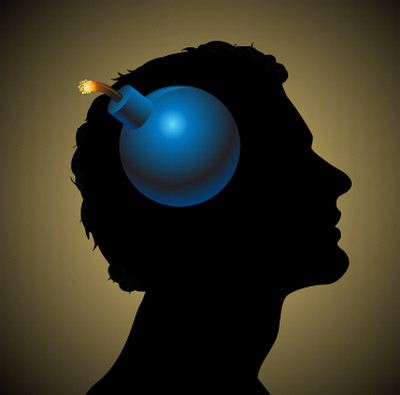What is Exploding Head Syndrome?
The exploding head syndrome sounds like it comes from a science fiction movie, but it is a real phenomenon which remains a medical mystery. People experience a loud and frightening noise, like a loud bang, a shotgun, a roar, thunder, etc. It happens either while the patient is falling asleep or right after falling asleep. The sound is sudden and awakens them. Fear and anxiety follows, along with a surge of adrenaline. It is a common sleep disorder which is not harmful but it is stressful and disturbing for the patient. [1]
Actually it seems that most people have this sort of incident at some time during their lives. It is startling or terrifying depending on the patient. There are other sleep disorders that have similar effects: sleep twitches, restless legs, sense of falling. These are referred to as sleep-related myoclonus. [2]
Symptoms of Exploding Head Syndrome
The basic symptoms of exploding head syndrome are the sudden awakening right after falling asleep. The person is usually agitated and often frightened. No pain is involved. The reason for the rude awakening is the loud sound or the noises the person heard. These sounds are entirely internal.
There is no evidence of an external source. The symptom of loud noises is reported by the patient with varying frequency and intensity. It may happen only once in their lifetime.
Who has Exploding Head Syndrome?
The typical patient is an adult over fifty years of age. Though younger men and women in high stress work environments have experienced it also. Women are more likely to report this syndrome. Some people fear they are going insane and are reluctant to tell anyone about the episodes. Children as young as ten have also reported it.[5, 6]
Causes of Exploding Head Syndrome
- The cause of exploding head syndrome remains a physiological mystery.
- External stress factors in the patient’s life seem to be major contributors. There is no known connection to any serious medical condition.
- Extreme fatigue is a factor. Withdrawing from certain prescription medications can contribute in some cases.
- Possible cause may be movement within the middle ear or some stimulation in the temporal lobe where hearing occurs. [4]
Diagnosis of Exploding Head Syndrome (EHS)
The puzzling thing is the patient may have once incident or many recurring episodes of exploding head syndrome. They may go for years with no episodes and then have another one. [4]
This syndrome is self reported. A good medical history of the patient is helpful, though there are no major health complications related to EHS. An examination at a sleep center can include a wide range of monitors to determine if there are any other sleep disorders.
Sleep Paralysis and Exploding Head Syndrome
Both sleep paralysis and exploding head syndrome are types of parasomnia. Parasomnia is a condition or behavior which happens around sleeping times. Both are self reported. Neither has an obvious external cause. Both are a disruption in the normal transition from being awake to being asleep. Sleep paralysis happens during REM sleep and is a state of not being able to move or speak. [8]
Treatment of Exploding Head Syndrome
There are ways to minimize the impact of exploding head syndrome and the first step in treating this disturbing sleep syndrome is to recognize that it is not a symptom of a serious condition. Learn to relax when it happens.
- Relax
- Reduce Stress
- Maintain a Balanced Diet
- Sleep regularly and routinely.
- Seek professional help.
Stress is unavoidable, but learning how to de-stress yourself and striving for a more balance life can help reduce these incidents.
Believe it or not, what you eat and drink during the day helps your body deal with routine stress and helps your body during your sleep times. Try to set a sleep schedule and keep it regular. Most adults need a minimum of six hours of sleep each night. It may take you 8 hours to reach that goal when you consider time to unwind and relax before sleep.
If your exploding head syndrome is causing sleep deprivation, it is time to see a doctor who can deal with this condition. There are prescription medications that can reduce the frequency and the intensity of these incidents if the home remedies and lifestyle changes do not help. [2]
Research on Exploding Head Syndrome
Some research has used recordings during the patient’s sleep. EEG and EKGs and other monitoring devices are used at sleep centers to study what is happening in the patient’s head and body when they experience the exploding head incidents. There are some changes in EEG recordings and no evidence that epilepsy is involved.
Researchers indicated that once the patients understood the benign nature of the incidents they began to experience relief. Clomipramine is prescribed with reasonable success. It appears that this syndrome is more directly related to the person’s emotional condition and stress during their regular awake times. [3]
References
- http://www.huffingtonpost.com/2011/12/23/exploding-head-syndrome-tips_n_1167768.html
- http://www.ncbi.nlm.nih.gov/pubmed/1896728
- http://en.wikipedia.org/wiki/Exploding_head_syndrome
- http://www.sleepassociation.org/index.php?p=explodingheadsyndrome
- http://www.rightdiagnosis.com/e/exploding_head_syndrome/intro.htm
- http://sleepdisorders.about.com/od/commonsleepdisorders/a/Exploding_Head_Syndrome.htm



